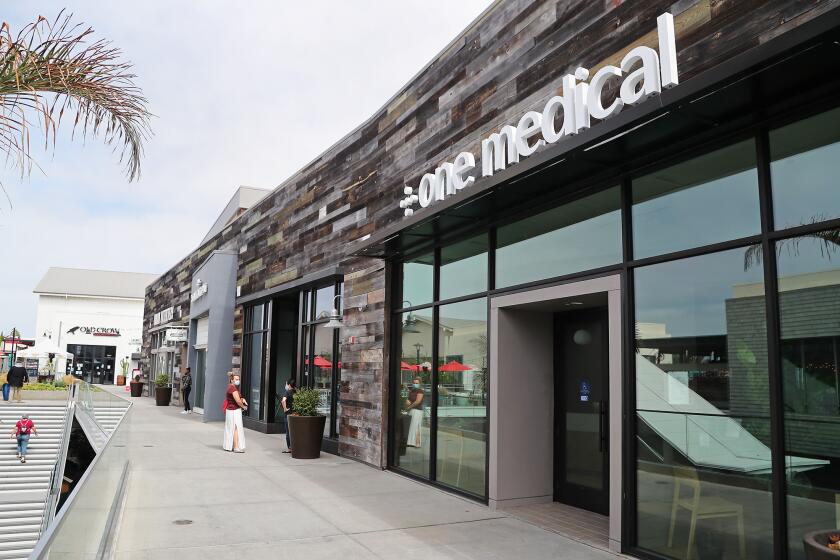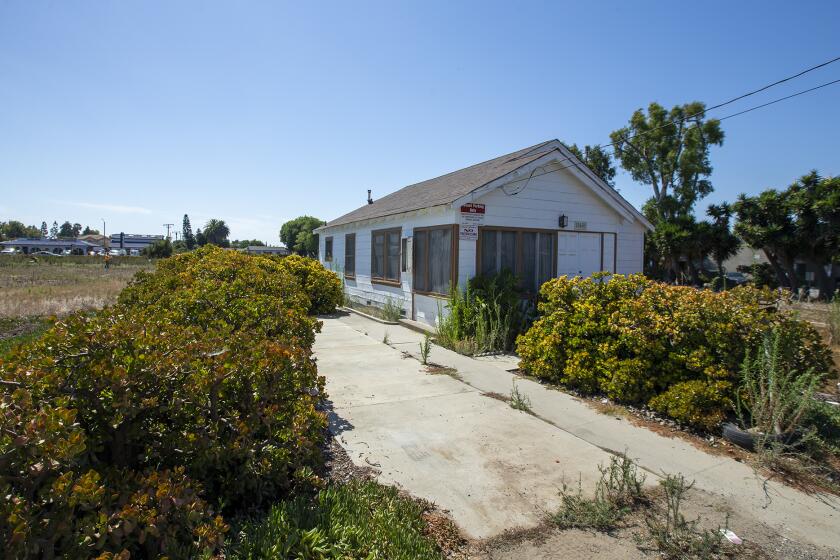‘We’ve never seen such a demand in our history’: Domestic violence resource centers see an uptick in calls
- Share via
Safer-at-home orders had a distorted meaning for those whose homes weren’t safe even in pre-pandemic times.
Hotlines started ringing at a higher rate in March compared to previous years. People in abusive homes were calling for shelter, counseling, legal services and safety plans.
Orange County-based domestic violence resource centers, which are classified as an essential service, stepped up outreach and began to deliver services remotely. But some staff said the demand is greater than the resources available, especially for housing.
Waiting lists were created when rental assistance funds were tapped out and shelters were full with no vacancies expected any time soon. Although the centers implemented alternative solutions to meet high demand, some have also turned away people who are mounting debt from back-pay rent or are ready to flee abusive homes.
Maricela Rios-Faust, CEO of Human Options, said calls doubled primarily for legal advocacy such as visitation custody, and there was a 100% increase in requests for food and other basic needs during the first two weeks of coronavirus-related shutdowns. They also saw a 50% increase in requests for parenting classes and the personal empowerment program, she said.
Women’s Transitional Living Center (WTLC) received a 70% increase in the number of callers compared to last year at the same time period.
“Some want to come to shelter, but many of those calls were people feeling an increased level of anxiety and fear. They just need help coping with that feeling,” said Mark Lee, CEO of WTLC.
Thyda Duong, program development director of Interval House, said their calls for housing services tripled since last year. At one point, staff were getting phone calls and emails for housing assistance every five minutes.
“Across the board, we are overwhelmed with requests. We’ve never seen such a demand in our history. We’ve been around for over 40 years, and this is really unprecedented,” said Duong.
The primary care provider opened its second Orange County location on July 27 in Pacific City.
Laura’s House Clinical Coordinator Hadil Penalvert, said the hotline used to get about 60 calls a week, and the number increased to 100 a day. Most of the calls are people looking for shelter or to develop a safety plan.
Penalvert attributes the influx of calls to spending more time at home with abusive partners.
“Before COVID, the survivor would be at work or be able to pass a couple of hours away from their partner,” said Penalvert. “There was a little bit more freedom. You don’t really have ways to see other people now. You can be completely isolated.”
She explained isolation is a key tactic in maintaining control over victims.
Added stressors such as losing jobs, managing work from home while taking care of kids and an increase in substance abuse are common factors that heighten violence and abuse.
Lee refers to this time period as a “pressure cooker situation” but is careful to note stress doesn’t cause domestic violence.
“The stresses aren’t any different from anybody else who’s going through this time period,” said Lee. “What’s different about those in abusive situations is that any one of those stressors can trigger violence or abusive behavior.”
He added, “From the perspective of the person that’s causing the harm, there is a need to have control that they would only have from, for example, work. Maybe they lost their job and no longer have control over finances and they are looking for something else in their lives to control. It might be their partner or kids.”
The intensity of cases increased as well.
“In one week, [Human Options] brought in five families. Three families had strangulation in their history, and it had happened during the stay-at-home orders, which is a fairly high percentage of the cases,” said Rios-Faust.
Shelter and housing assistance
All four centers offer emergency and short-term shelter in confidential locations. They also have varying resources to find permanent housing.
Penalvert describes the experience of seeking shelter as “having to start over again,” since those who are participating in the shelter program can’t return to previous jobs, schools or neighborhoods. To prevent location tracking, they can’t use digital devices. During the program, they are allowed one call per day from a blocked number.
Laura’s House implemented social distancing, limiting shared rooms and interactions in common areas.
Although most of Human Options’ shelters have individual rooms with a private bathroom, some living situations were set up with a shared bathroom. The center decided to not use shared space and negotiated a deal with a local hotel to supplement the rooms they lost due to COVID-19 precautions.
Interval House also extended their hotel program because its shelters are at full capacity.
“Both domestic violence victims and survivors, who we’ve helped before [and] were taking their first steps towards financial stability, reach back out to us for assistance with housing because of the impacts of COVID-19 and unemployment,” said Duong. “We’ve also seen community members at large who aren’t experiencing domestic violence reach out.”
The Huntington Beach City Council voted 6-0 to take action to begin operation of an expanded 174-bed homeless shelter facility on Cameron Lane and Beach Boulevard.
Interval House provides rental assistance to residents in need. Although they’ve offered the program for over 25 years, they’ve expanded it over the last decade. The center began administering a homeless prevention program during the previous economic recession in 2008.
Duong said people who are requesting rent assistance don’t have savings or the ability to pay back-rent so they are accumulating bigger debt.
“At some point we had to just put people on waiting lists for rental assistance because we simply ran out of funding,” said Duong. “We’re working really hard to turn over every rock to see what is available in terms of funding and resources so that we’re able to continue to help people.”
WTLC also created a waiting list for shelter spaces.
Typically, families or individuals graduate from the shelter program and get accepted into a housing program or find a roommate to move out on their own. It allows for bed spaces to become available. But a lot of housing programs are not accepting new clients.
“Because of a pandemic, there’s been a huge fault in these other housing programs or live-in situations that our families and individuals would actually go into,” said Lee. “They have nowhere else to go, so we are having them stay with us for a longer period of time. What’s happening is when we get callers who are ready to flee from their domestic violence situation, we are at a position where we can’t accept them because our shelters are full.”
Motels serve as a temporary extension of the shelter program. Typically, the center uses motels for a couple of nights as the clients wait for short-term housing spaces to become available.
Lee said recently families have stayed in motels for 30 days or more. One family is still waiting for shelter to become available after staying at a motel for 90 days.
Remote services and programs
Therapy, support groups, legal services and educational programs have transitioned to be conducted through phone or internet for all of the centers, but it can come with risks.
“It has been a little challenging. A lot of the time, there’s technology abuse. Their phones or email are being tracked,” said Penalvert.
Part of teletherapy and online support group safety measures include making sure clients are alone in a room or alternative space.
“We have clients that do therapy from their parked cars, go to a family member’s house or take a walk outdoors,” said Penalvert.
Human Options kept some of their offices partially open to half of staff while completely shutting down to go remote for other locations, such as Minnie Street Family Resource Center in Santa Ana. They anticipated access to the centers would become less visible, so they reverse-called all clients letting them know services, including telehealth, would be available.
Rios-Faust said Human Options lost entry points of connection like teachers and school administrators who would notice students living in abusive homes or access to seniors, who are historically connected to services through home visits.
They’ve enlisted teens, who participate in the ambassador program, to write letters to seniors.
“Some of the seniors wrote back and that was really new for us — connecting multiple generations. Our goal is to make sure that we’re addressing relationship violence across the lifespan,” said Rios-Faust.
The ambassador program is a 10-week training for high-school-age students to become peer-to-peer mentors, and it was created to address dating abuse among teens. This year, a small group met over Zoom to complete their cohort and a service-learning project.
“At times it was a little bit awkward because we had never met, but I found some wonderful things about it,” said Marissa Presley, prevention educator at Human Options. “In the past, we would do it at different high schools but only the youth from the same high school would participate. Now I have youth from all different high schools in Orange County.”
Financial hits to an essential service
The four centers are nonprofits who rely on fundraising and private donors. They’ve taken a financial hit and are determined to find new ways to make up for losses.
WTLC’s reserves could last six months without any revenue. WTLC dipped into a small portion of its reserves to cover unexpected expenses related to the pandemic.
“We’re very hopeful that we won’t get to the point where we will use up all the reserve amount where then we will have to close our doors,” said Lee.
Human Options also had unexpected expenses to cover masks, cleaning supplies and technology upgrades for staff members to work remotely in a safe location.
The center’s largest gala, typically held in May, generates $500,000.
“Not having the event meant we need to try to generate that revenue,” said Rios-Faust. “We reached out to several donors [community stakeholders and foundations] to ask whether they would consider still supporting Human Options during this time. Fortunately many of them did. We also benefited from the resilience fund of the Orange County Community Foundation.”
“We are definitely seeing a rise in domestic violence and really need to provide services as an ongoing essential service.”
All the latest on Orange County from Orange County.
Get our free TimesOC newsletter.
You may occasionally receive promotional content from the Daily Pilot.






